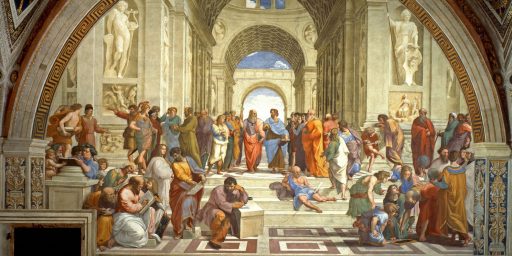The Mundanity of Authoritarianism
Some recommended reading.

I would highly recommend the following essay by Thomas Pepinsky, a political scientist at Cornell: Life in authoritarian states is mostly boring and tolerable.
The main thrust of the article is that authoritarianism, in the main, is not what the popular conception has it to be:
The mental image that most Americans harbor of what actual authoritarianism looks like is fantastical and cartoonish. This vision has jackbooted thugs, all-powerful elites acting with impunity, poverty and desperate hardship for everyone else, strict controls on political expression and mobilization, and a dictator who spends his time ordering the murder or disappearance of his opponents using an effective and wholly compliant security apparatus. This image of authoritarianism comes from the popular media (dictators in movies are never constrained by anything but open insurrection), from American mythmaking about the Founding (free men throwing off the yoke of British tyranny), and from a kind of “imaginary othering” in which the opposite of democracy is the absence of everything that characterizes the one democracy that one knows.
Still, that fantastical image of authoritarianism is entirely misleading as a description of modern authoritarian rule and life under it. It is a description, to some approximation, of totalitarianism.
[…]
The reality is that everyday life under the kinds of authoritarianism that exist today is very familiar to most Americans. You go to work, you eat your lunch, you go home to your family. There are schools and businesses, and some people “make it” through hard work and luck. Most people worry about making sure their kids get into good schools. The military is in the barracks, and the police mostly investigate crimes and solve cases. There is political dissent, if rarely open protest, but in general people are free to complain to one another. There are even elections. This is Malaysia, and many countries like it.
You get the idea, but I would recommend the whole thing.
Simply put, an authoritarian regime is not likely to be Nazi Germany or Stalin’s USSR (or Orwell’s Oceania), but rather a less intrusive regime on a daily basis. Pepinsky’s usage of Malaysia in his essay is telling and made me think of my recent trip (in the Before Times) to Vietnam, wherein there were essentially no signs to the casual observer that one was in a non-democratic country.
Let me especially highlight, however, the following:
You know that you are no longer living in a democracy because the elections in which you are participating no longer can yield political change.
Let me stress that the US is not yet at this point, although it is closer in some ways than should be comfortable for all of us. But this type of problem, not being able to effectuate change via the ballot box, is why I carry on so much about the unrepresentative nature of our institutions. Change can happen still in the US via the ballot box, but our institutions (e.g., the Electoral College, the various problems with plurality elections in single-seat districts, the Senate, etc.) make it unfairly difficult for the electoral process to lead to policy change. This is why, I think, we see the bubbling frustration in the population and why change is needed.
As it stands, places like Wisconsin (to pick an example) are so gerrymandered that it takes an extraordinary outcome to lead to change via the vote.
That is a huge problem.
And, I agree that we run the serious risk of moving further in the direction of a hybrid regime of the type Pepinsky describes if Trump wins another four-year term.






The reality is that everyday life under the kinds of authoritarianism that exist today is very familiar to most Americans.
This is because most jobs are basically authoritarian environments which rely on fear to keep the worker in place. The workplace is this weird blackbox where Americans don’t go. It’s where you are not free, and unless it’s HR talking about diversity, it’s all exactly as the world should be.
“The banality of evil.” Some years ago the British military historian Max Hastings wrote a history of the end of WWII in Europe, Armageddon. I was struck by him quoting average Germans saying that when the Allies won, they’d lose their “freedom”. They’re living in a Fascist dictatorship and they think they have freedom? But if you were a good German of the approved ethnic background and sexual orientation, not of military age and gender, and not prone to unorthodox political opinions, you were pretty free. At least until you got bombed out or the Russians arrived.
The frail old man’s health might be what saves us.
Part of what the Trumpers love is Trump — his willingness to say awful things without regards to consequences. They also loved Palin.
But Pence? Let’s all just acknowledge that no one has ever thought there might be a Cult of Personality around Pence. Mother wouldn’t allow it.
Our institutions might not survive four more years of Trump, but they’re strong enough to keep the order of succession. And Pence would be a more competent Trump knock-off without the charisma and without the brazen shamelessness.
Pence will ruin the push to authoritarianism by being Pence. And the Trump children will fight among themselves to be the heir to the Orange.
I may be overly optimistic.
I don’t know what that man’s problem is, but he’s not describing an authoritarian regime, he’s describing the Greatest Democracy on Earth.
That sounds nice.
Through nihilism and erosion of institutions, the Republicans may have pushed things to a point where the next President (of either party) is going to have to be much more Autocratic than a lot of people are comfortable with just to get the basic needs of governance done.
Plus we have a pandemic, and need to balance public health measures against individual liberty. And we have already had instances of armed protesters storming state capitals.
I’m glad the Democrats ran an ancient man with many decades of experience in government and a deep love for the institutions. A man with few authoritarian ambitions and a short timeline left if he starts getting ideas.
Stay well, Joe Biden. You may not be the man we want, and you’re better than the man we deserve, but you are the man we need.
The person at the center of the cult has to actually have a personality for the whole thing to work so of course no one has ever thought of Pence in that way…I’ve known goldfish that have more personality than him…
An interesting quote from the linked article, which bears reflexion given the take-over of the Republican party in the US by what is essentially the white-supremacist reactionary fraction
Such political culture would be the base of the reaction as it were.
One thing that doesn’t get discussed enough about authoritarian regimes is how popular they are, and how peaceful and pleasant life in them is.
At least, for a certain group of people, who are large enough to sustain the regime.
Except for the freakish oddities like Mao’s China and Stalin’s USSR, life in most of the smaller kleptocracies and autocracies is actually pleasant for the members of the ruling class and their allies.
We also need to recognize that in many parts of America, for most of our history, this was the norm, where only a plurality or small majority of citizens actually had full rights and freedoms, while a minority or sometimes a majority was deprived of them.
Its important to remember this, as we try to assure ourselves that “it can’t happen here”. Yes it can, and yes it has.